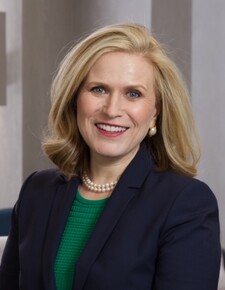Ink Runs in Her Veins: MFIA Supervising Attorney Jennifer Borg

Born into a family that owned and operated local newspapers for four generations, Media Freedom and Information Access Clinic4 supervising attorney Jennifer Borg likes to say that ink runs in her veins. Her lifelong connection to the media — with 20 years of experience in media law practice and a deep commitment to the press — shapes Borg’s approach to the clinic.
After graduating from law school at Columbia, Borg first decided to specialize in labor and employment law. She began her career at Breed Abbott and Morgan before moving onto a position at Proskauer Rose LLC, one of the leading labor and employment law practices in the country.

In 1995 she got a phone call from her father, the publisher of the family newspapers at North Jersey Media Group. The head of human resources was retiring — why didn’t Jennifer take her place? Borg joined the family business not only leading HR but also as in-house general counsel. Over the next 20 years, she shaped a robust legal department at the media group, taking charge of everything from libel litigation to fighting for access to public records and open courtrooms.
The Borg family’s media holdings were centered on The Bergen Record, a newspaper that had been in the family since 1920, when Borg’s great grandfather John Borg purchased it. She describes him as an original “idea man,” a 1920s term for publishers who treated newspapers as a public trust and saw their work as holding government, business and society accountable for their actions.
With the biggest state house bureau in the country and strong support for investigative stories, The Record was known for its robust newsroom and strong investigative reporting.
“For all four generations, our family was proud to uphold John’s vision and his commitment to our readers, our employees and the community,” Borg said.
By the 2010s, threatened by the rise of online media, local journalism was struggling. In 2016, the Borg family made the difficult and painful decision to sell their no-longer-profitable newspapers.
“I think there is something eminently special about the press and the function that it serves,” Borg said. “If we lose that, we lose democracy. I cannot stress enough how vital a free press is to uphold our democratic values.”
I think there is something eminently special about the press and the function that it serves. If we lose that, we lose democracy. I cannot stress enough how vital a free press is to uphold our democratic values.”
— Jennifer Borg, Clinical Lecturer in Law
The collapse of local newspapers around the country was also part of the impetus for setting up MFIA in 2009. Borg first became acquainted with the clinic in 2017 when she served as its local counsel for New Jersey in a case fought on behalf of The New York Times.
In 2018, Borg joined MFIA’s newly founded DocProject5 as a Visiting Clinical Lecturer. Borg’s newsroom experience was crucial in shaping DocProject’s work. The legal issues of libel, invasion of privacy, trespass, and newsgathering torts were familiar from the world of newspapers. But instead of reviewing stories for print, Borg and her students were reviewing investigative documentary films.
For 2023-24, Borg is Clinical Fellow and Supervising Attorney for the clinic, where her docket includes several federal Freedom of Information Act cases6, a relatively new area for her that she is enjoying.
Borg’s approach to clinical education is shaped by her two decades of hands-on experience in media law.
“The goal of the clinic is to teach the things you’re not going to learn elsewhere in law school: how things really happen,” Borg said. “The answer is never wrapped up in a bow. I always try to show my students that you have to get comfortable with that discomfort. The answer is often ‘It depends.’ Otherwise, you wouldn’t need a lawyer.”
Borg is also of counsel at New Jersey law firm Pashman Stein Walder Hayden, where she takes on media law cases.
Outside work, Borg is a huge lover of dogs and supports the New Haven Police Department’s K9 unit. One of the things she loves most about Yale, she adds, “of course, is Handsome Dan7.”
The Media Freedom and Information Access Clinic at Yale Law School is a law student clinic dedicated to increasing government transparency, defending the essential work of news gatherers, and protecting freedom of expression by providing pro bono legal services, pursuing impact litigation and developing policy initiatives.


